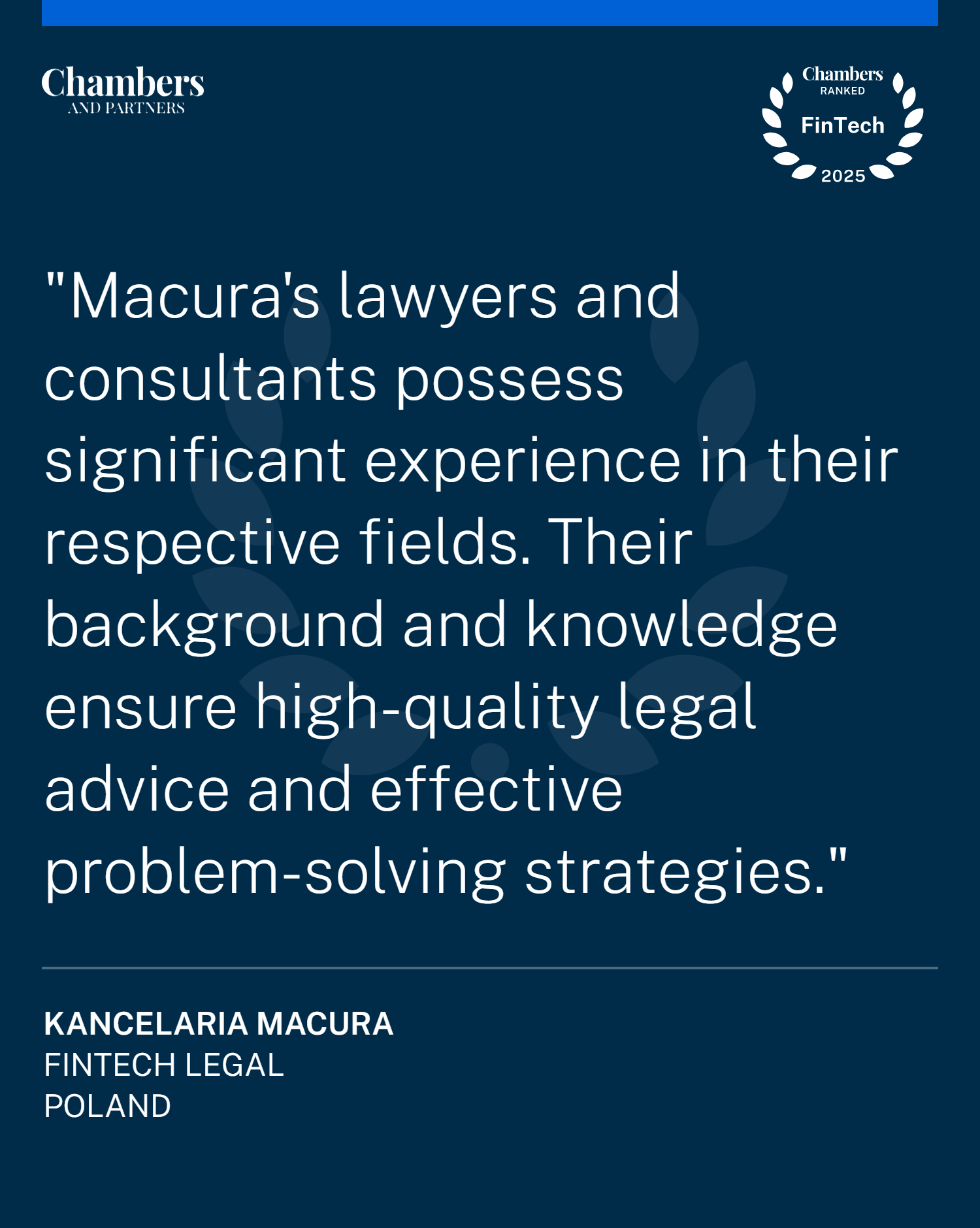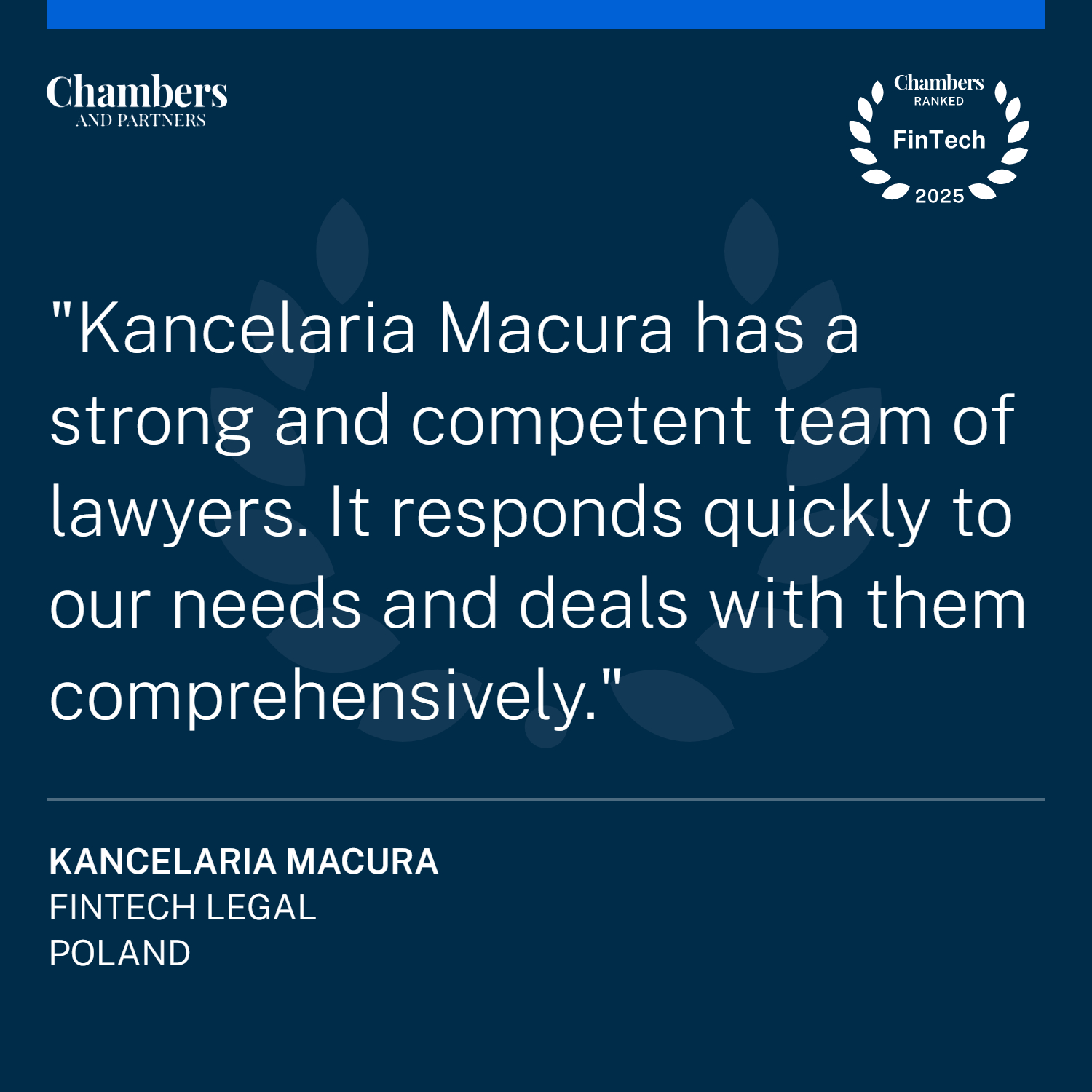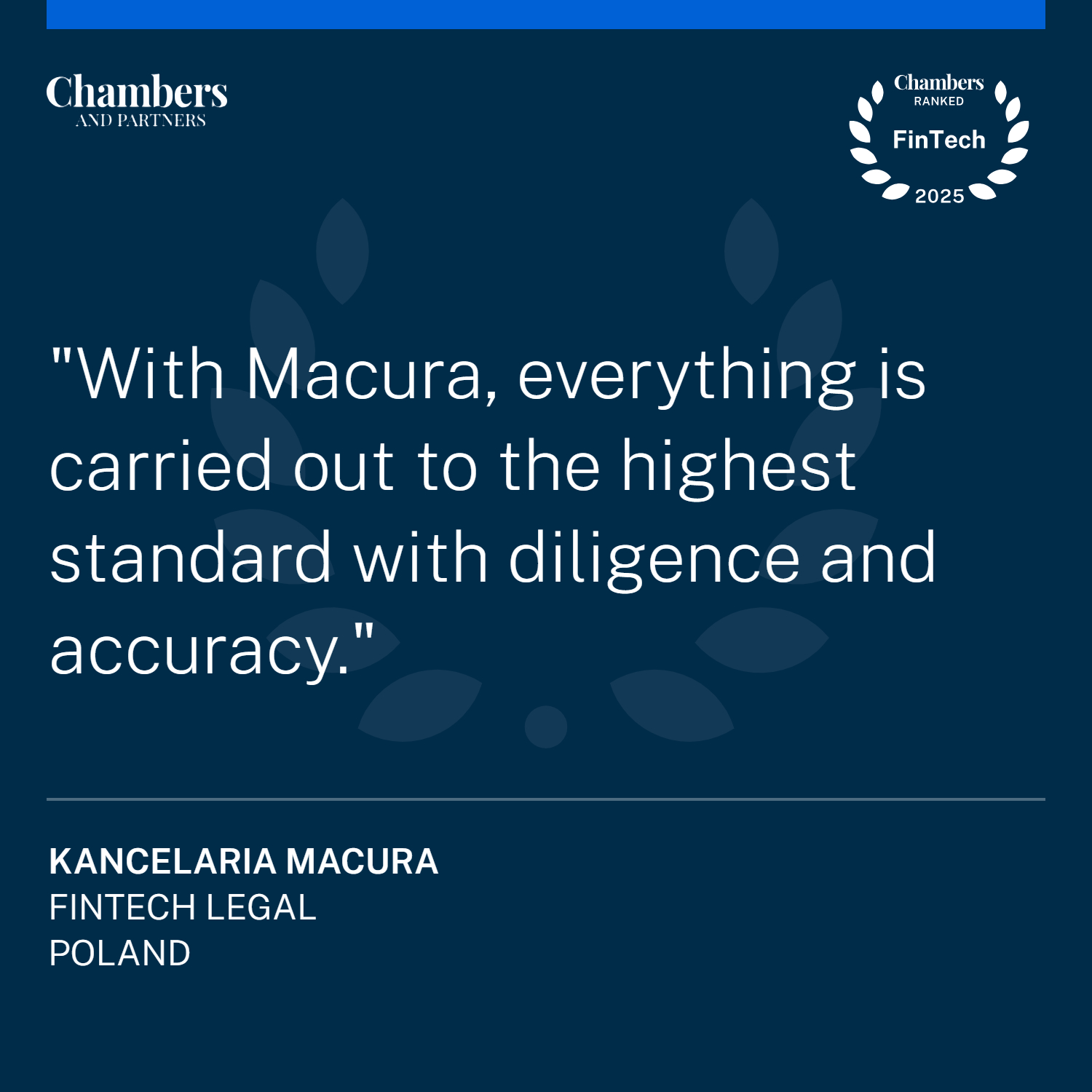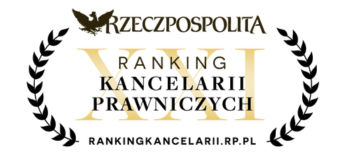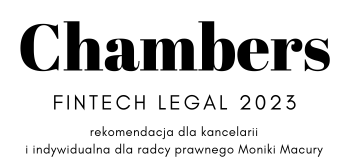
Specializations
Intelectual Property
We provide advice on intellectual property protection for software developers.
The firm’s lawyers specialise in the legal aspects of implementing IT solutions and new technologies. With the development of technology, including blockchain networks or artificial intelligence, there are more and more innovations and opportunities for their application. However, legal regulations have not kept up with the reality around us, particularly in such cutting-edge areas.
Entrepreneurs in FinTech, LendTech and e-commerce as well as in the banking and finance sector need the support of lawyers who know the regulations and can create and adapt existing legal solutions to areas that are not yet regulated. We provide our clients with solutions that reduce the legal risks associated with a new technology project. We assist in the implementation of innovative solutions by creating the legal framework for the planned projects.

Based on national, European and international regulations concerning the law of new technologies, including artificial intelligence (AI), blockchain technology, crypto-assets, we offer legal support to the FinTech, LendTech, e-commerce and banking and finance sectors as well as the IT industry. Based on Polish and European regulations, including documents such as:
- Regulation (EU) 2016/679 of the European Parliament and of the Council of 27 April 2016 on the protection of natural persons in relation to the processing of data, personal data and on the free movement of such data and repealing Directive 95/46/EC (General Data Protection Regulation) (RODO);
- Regulation (EU) 2022/868 of the European Parliament and of the Council of 30 May 2022 on European data governance and amending Regulation (EU) 2018/1724 (Data Governance Act);
- Guidelines and documents issued by the European Data Protection Board (EROD);
- The Act of 10 May 2018. on the protection of personal data;
- Act of 18 July 2002 on the provision of electronic services;
- specific industry regulations, including:
- Act of 16 July 2004 Telecommunications Law;
- Act of 29 August 1997 – Banking Law;
- Act of 1 March 2018 on the prevention of money laundering and financing of terrorism;
- Act of 19 August 2011 on payment services;
- Act of 9 April 2010 on sharing of business information and exchange of business data;
- Act of 29 July 2005 on trading in financial instruments;
- The Act of 12 May 2011 on consumer credit;
- Regulation (EU) 2022/858 of the European Parliament and of the Council of 30 May 2022 on a pilot system for the the needs of market infrastructures based on distributed ledger technology, as well as amendments to Regulations (EU) No 600/2014 and (EU) No 909/2014 and Directive 2014/65/EU (DLT Pilot Regime);
- Regulations and guidelines of the Financial Supervisory Commission (in particular the Financial Supervisory Authority’s Position on the issuance and trading of cryptoassets) and the European Banking Authority;
- Guidance and recommendations from the Financial Action Task Force (FATF), in particular the FATF Standards on Virtual Assets and VASPs and Guidance for a Risk-Based Approach to Virtual Assets and Virtual Asset Service Providers;
- upcoming regulations, including:
- Regulation of the European Parliament and of the Council laying down harmonised rules on artificial intelligence (AI ACT) and amending certain legislative acts of the union (AI ACT);
- Regulation of the European Parliament and of the Council on cryptoasset markets and amending Directive (EU) 2019/1937 (MICA);
- Regulation of the European Parliament and of the Council on the operational digital resilience of the financial sector and amending Regulations (EC) No 1060/2009, (EU) No 648/2012, (EU) No 600/2014 and (EU) No 909/2014 (DORA);
We help implement modern technological solutions, often changing the face of the banking and financial sector.
It should be emphasised that there is not infrequently a lack of regulations or legislative work in progress in the area of new technologies, as in the case of the EU regulation on artificial intelligence, referred to as the Artificial Intelligence Act (AI Act). In light of the work on this document, very many current solutions or systems in the FinTech industry in the field of automated credit scoring or automated scoring models may be considered AI systems (due to the broad definition) and consequently also high-risk AI systems (due to the definition of high-risk AI system). Consequently, such AI solutions or systems will have to comply with a number of additional requirements set out in the Regulation. Traders will be required to carry out an assessment of the risks posed by AI-based solutions, will be required to provide clear information about the AI system to users.
Legislative work is also being advanced to regulate the broader cryptocurrency market. Of particular note is the draft Crypto Assets Markets Act (MICA), which will be a revolution for much of the cryptocurrency industry in Europe. There is no doubt that many projects using cryptocurrencies will have to adapt to the new legal and regulatory reality that this will come with the entry into force of the MICA regulation.

That is why, when supporting clients in the process of implementing new technological solutions, we answer questions and propose practical and risk-reducing solutions, taking into account current business realities as well as planned legislation. If you are wondering or in doubt:
- How to bring artificial intelligence (AI)-based solutions to market?
- What research, testing and validation procedures should be carried out before, during and after the development of an AI system?
- What is the liability for damages caused by AI?
- what will the entry into force of the EU Artificial Intelligence Regulation, referred to as the Artificial Intelligence Act, mean for my organisation?
- Which AI industries are qualified as high-risk systems?
- What requirements will high-risk AI systems have to meet?
- What are the legal implications of issuing tokens, crypto-assets?
- What are the legal restrictions on the implementation of blockchain-based technology?
- What are the possibilities for effective implementation of the right to be forgotten in networks based on blockchain technology?
- What are the possible ways of protecting the creations of new technology and artificial intelligence?
- how to properly structure a contract for the implementation and maintenance of an IT system?
- How to protect customers’ personal data in cloud technologies?
- Is the planned IT solution architecture compatible with open source software licences
- What are the legal risks in the area of implementing innovative online and mobile payment solutions?
Get in touch with our lawyers who specialise in new technology and IT issues, in particular blochain technology, cryptocurrencies and artificial intelligence.

- Legal support for Artificial Intelligence (AI) implementation projects;
- Legal advice for systems based on machine-learning, but also systems based on logical methods, knowledge, statistical approaches, search and optimisation methods
- Development of concepts for the use of tokens representing rights or property values (in blockchain technology);
- Legal and tax assessment of blockchain-based services;
- Legal support for cryptocurrency market activities;
- Advice on the opening of cryptocurrency exchanges;
- Legal assistance for the establishment of cryptocurrency exchanges;
- Advice on the protection of intellectual property for software developers, mobile applications and Internet service providers;
- Drafting and negotiating contracts for the implementation of IT systems (particularly in the agile model), advice on managing IT projects;
- Advice on data collection and processing in IT systems and on the protection of databases;
- Counselling in disputes arising from infringement of software copyrights;
- Drafting of licence and outsourcing agreements;
- Drafting contracts for the use of services in the SaaS model;
- Counselling on the use of cloud solutions, including compliance with RODO;
- Legal services for implementations of IT systems, including with the use of cloud technology (cloud computing);
- Drafting of licence and service agreements (SLA);
- Drafting contracts for the provision of IT services, as well as contracts for the supply of IT equipment;
- Legal advice on IT outsourcing, including with regard to financial market requirements;
- Legal service of data migration processes;
- Legal advice on data processing in the IT area, taking into account the provisions of RODO (GDPR), including the application of privacy by design and privacy by default principles;
- Legal advice to developers of computer applications and software, including computer games and online games;
- Advice on running an e-business;
- Legal advice in the area of innovative online payment solutions and mobile payments, setting up structures and procedures for concluding financial transactions using electronic devices.

We specialise in advising the FinTech, LendTech, e-commerce and banking and finance industries on the implementation of technological solutions based in particular on the blockchain network and artificial intelligence.
We assist entrepreneurs planning to set up a cryptocurrency exchange or cryptocurrency exchanges and in the trading of virtual currencies.
We advise software and application developers to protect their intellectual property. We have extensive experience in dealing with online businesses, start-ups and software houses.
We monitor legislation and case law relating to the new technology and IT sector in Poland, the European Union and non-EU countries. We encourage you to read our blog, where we share our practical experience gained during the implementation of various projects.




